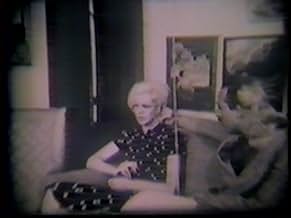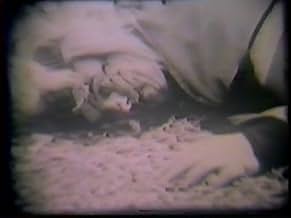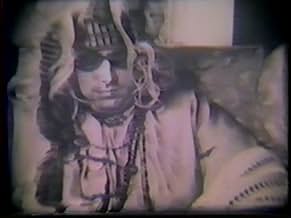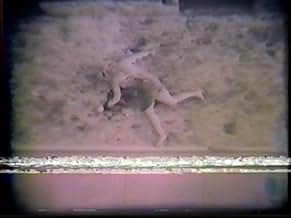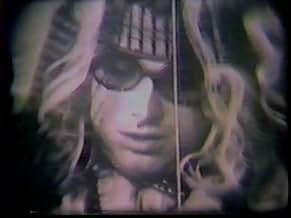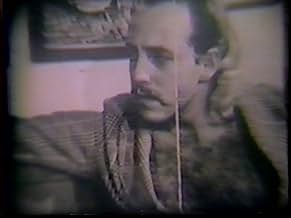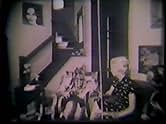अपनी भाषा में प्लॉट जोड़ेंA John Waters film where Divine plays Diane Linkletter, daughter of Art Linkletter and commits suicide.A John Waters film where Divine plays Diane Linkletter, daughter of Art Linkletter and commits suicide.A John Waters film where Divine plays Diane Linkletter, daughter of Art Linkletter and commits suicide.
- निर्देशक
- लेखक
- स्टार्स
5.8570
1
2
3
4
5
6
7
8
9
10
फ़ीचर्ड समीक्षाएं
Hooray for John and his Good Bad Taste
MOST Waters fans will think this is hilarious, though you'll meet the rogue who thinks it's in bad taste. But then, criticizing Waters for making a film in "bad taste" is like criticizing a hippie for smoking the herb: it's just what they do.
The short starts out with a creepy recording of Diane speaking at the beginning, and is repeated at the end; the picture is grainy and makes Divine look wild-eyed and insane(yes!). Divine is really, really funny, and even though David Lochary gets a little befuddled on a couple of his lines, he and Bonnie still do a fine job.
I went nuts trying to figure out how I'd see this short for a very long time. Some angel posted it on medicinefilms.com; they say they're John Waters, which makes me both skeptical and desperate.
So... go watch it and decide for yourself.
The short starts out with a creepy recording of Diane speaking at the beginning, and is repeated at the end; the picture is grainy and makes Divine look wild-eyed and insane(yes!). Divine is really, really funny, and even though David Lochary gets a little befuddled on a couple of his lines, he and Bonnie still do a fine job.
I went nuts trying to figure out how I'd see this short for a very long time. Some angel posted it on medicinefilms.com; they say they're John Waters, which makes me both skeptical and desperate.
So... go watch it and decide for yourself.
Made 4 decades ago, this Waters short film is still controversial...
I hear more people talking about this short film now, than when it was made, or at any time since it's production.
I first saw it when I purchased a VHS tape of Divine's live stage show, "THE NEON WOMAN."
That show was taped on 1960's B+W videotape (NOT the same kind of tape on VHS cassettes) in 1967.
When home video first became available to the public, "THE NEON WOMAN" was published on VHS by the New York Film Annex. To fill out the tape, the NYFA included Waters' short film, "The Diane Linkletter Story." That was more than 20 years ago.
Whether or not you like Art Linkletter, the unvarnished truth of the matter is that he conspired with the Nixon administration (in the latter's "anti-drug" campaign) to allow the public to think that Diane jumped out of that upper-story window to her death, while on LSD. The truth is, she had not taken LSD for over a year before she died, and the drug had absolutely nothing to do with her death. Furthermore, an autopsy showed that she had no drugs, whatsoever, in her body at the time of her death. Stretching the truth (to put it mildly) was a common practice by Nixon and his followers (of which, Art Linkletter was one).
When I first purchased it, I knew that this NYFA-published VHS tape was a special treasure. I don't foresee any possible DVD release of this film coming any time soon, although I would love to see the film made available on disc, so others can see it, and own it.
Perhaps, some day, Waters will be able to get it published on DVD, with an explanation of Art Linkletter's shameful "use" of his daughter's suicide to further right-wing anti-drug propaganda.
I first saw it when I purchased a VHS tape of Divine's live stage show, "THE NEON WOMAN."
That show was taped on 1960's B+W videotape (NOT the same kind of tape on VHS cassettes) in 1967.
When home video first became available to the public, "THE NEON WOMAN" was published on VHS by the New York Film Annex. To fill out the tape, the NYFA included Waters' short film, "The Diane Linkletter Story." That was more than 20 years ago.
Whether or not you like Art Linkletter, the unvarnished truth of the matter is that he conspired with the Nixon administration (in the latter's "anti-drug" campaign) to allow the public to think that Diane jumped out of that upper-story window to her death, while on LSD. The truth is, she had not taken LSD for over a year before she died, and the drug had absolutely nothing to do with her death. Furthermore, an autopsy showed that she had no drugs, whatsoever, in her body at the time of her death. Stretching the truth (to put it mildly) was a common practice by Nixon and his followers (of which, Art Linkletter was one).
When I first purchased it, I knew that this NYFA-published VHS tape was a special treasure. I don't foresee any possible DVD release of this film coming any time soon, although I would love to see the film made available on disc, so others can see it, and own it.
Perhaps, some day, Waters will be able to get it published on DVD, with an explanation of Art Linkletter's shameful "use" of his daughter's suicide to further right-wing anti-drug propaganda.
A well done short film
This film was distasteful in parts. John Waters has an ironic, irreverent sense of humor of course. It seemed realistic through most of it, and had kind of a documentary feel to it. It was a good social commentary. Diane's parents were portrayed as quite judgmental. They were talking about her, and especially they were judging her friends, as they were waiting for Diane to come home. Her parents seemed to not want to listen to Diane, only to judge. The part at the beginning with Diane smoking drugs was distasteful, yet funny. As was the hokey warning message from the father to his daughter. Soft music plays during this melodramatic line, "Come back. Come back before you are trapped in a life that daily becomes more aimless and unreal."
Strange Short from Waters
The Diane Linkletter Story (1970)
** 1/2 (out of 4)
Art and Lois Linkletter (David Lochary, Mary Vivian Pearce) are waiting on their daughter Diane (Divine) to get home. The parents are worried and once the daughter gets home it leads to a very big argument, which then turns to tragedy.
This short from John Waters was apparently made so that the director could try out a new camera. When viewing it today it perfectly fits in with his bad taste cinema because the names used were real people and the film pretty much spoofs a real event. Art Linkletter was a successful television star and his daughter Diane killed herself. That's pretty much what was re-enacted here.
On a technical level there's nothing ground-breaking here but I actually thought the 9-minute short was at least entertaining. The performances aren't the greatest but they're fun enough in that bizarre John Waters world. After all, you're watching people who would play a big part in PINK FLAMINGOS. Fans of Waters will want to check this out for certain.
** 1/2 (out of 4)
Art and Lois Linkletter (David Lochary, Mary Vivian Pearce) are waiting on their daughter Diane (Divine) to get home. The parents are worried and once the daughter gets home it leads to a very big argument, which then turns to tragedy.
This short from John Waters was apparently made so that the director could try out a new camera. When viewing it today it perfectly fits in with his bad taste cinema because the names used were real people and the film pretty much spoofs a real event. Art Linkletter was a successful television star and his daughter Diane killed herself. That's pretty much what was re-enacted here.
On a technical level there's nothing ground-breaking here but I actually thought the 9-minute short was at least entertaining. The performances aren't the greatest but they're fun enough in that bizarre John Waters world. After all, you're watching people who would play a big part in PINK FLAMINGOS. Fans of Waters will want to check this out for certain.
Car, Car!
This is a "hidden" gem, essential for everyone who has burned out on reciting lines from "Female Trouble". A fictionalized account of Diane Linkletter's suicide, this is a real treat for any fan who can manage to get ahold of it.
Brief but extremely memorable, this features performances from early Dreamlanders Divine, David Lochary, and Mary Vivian Pearce as Diane Linkletter and her parents. "Irreverent" doesn't even come close to describing it, since it aspires to find the humor and pathos in Diane Linkletter's suicide, however the film resembles the reality of Linkletter's death only in passing. Mainly this is amusing simply because of the way it depicts the clash of Diane's hippie culture with the uppity values of the Linkletters. The film shows the Linkletters sitting up waiting for their daughter to come home from "the Strip", then the resulting confrontation when she drifts home stoned and babbling about communes and her boyfriend, Jim.
However it may seem, there is an important commentary embedded in this technically crude film. The truly disturbing aspect of it is the juxtaposition of Art Linkletter's spoken-word 45 "We Love You, Call Collect" on the soundtrack, which was recorded before Diane's death and featured Diane herself performing a spoken-word piece with her father about how teenagers can hide their drug use from their parents. Waters uses it first in the opening credits as "Diane" snorts drugs up her nose and mugs for the camera, then over the shot of her dying body at the short film's conclusion. After researching the actual details of Diane Linkletter's suicide, I discovered that drugs may not have played a part in her death at all. In fact, the medical reports showed no sign of drugs in her system. However, Art Linkletter immediately made a very big show of declaring that 'drugs' killed his daughter, and continues to lecture on the dangers of drugs while using Diane's death as an example of how drugs can destroy. Conversely, even witnesses who were around Diane shortly before her death attest that Diane was not in an altered state when she took her own life, a fact that makes Waters' film especially haunting. By placing Art Linkletter's bizarre spoken-word piece over top of images of Diane's decline and demise, Waters seems to be pointing out the bitter irony of Diane's suicide, suggesting that perhaps drugs did not damage Diane's psyche as much as the denial and disconnection from reality of the parents.
Brief but extremely memorable, this features performances from early Dreamlanders Divine, David Lochary, and Mary Vivian Pearce as Diane Linkletter and her parents. "Irreverent" doesn't even come close to describing it, since it aspires to find the humor and pathos in Diane Linkletter's suicide, however the film resembles the reality of Linkletter's death only in passing. Mainly this is amusing simply because of the way it depicts the clash of Diane's hippie culture with the uppity values of the Linkletters. The film shows the Linkletters sitting up waiting for their daughter to come home from "the Strip", then the resulting confrontation when she drifts home stoned and babbling about communes and her boyfriend, Jim.
However it may seem, there is an important commentary embedded in this technically crude film. The truly disturbing aspect of it is the juxtaposition of Art Linkletter's spoken-word 45 "We Love You, Call Collect" on the soundtrack, which was recorded before Diane's death and featured Diane herself performing a spoken-word piece with her father about how teenagers can hide their drug use from their parents. Waters uses it first in the opening credits as "Diane" snorts drugs up her nose and mugs for the camera, then over the shot of her dying body at the short film's conclusion. After researching the actual details of Diane Linkletter's suicide, I discovered that drugs may not have played a part in her death at all. In fact, the medical reports showed no sign of drugs in her system. However, Art Linkletter immediately made a very big show of declaring that 'drugs' killed his daughter, and continues to lecture on the dangers of drugs while using Diane's death as an example of how drugs can destroy. Conversely, even witnesses who were around Diane shortly before her death attest that Diane was not in an altered state when she took her own life, a fact that makes Waters' film especially haunting. By placing Art Linkletter's bizarre spoken-word piece over top of images of Diane's decline and demise, Waters seems to be pointing out the bitter irony of Diane's suicide, suggesting that perhaps drugs did not damage Diane's psyche as much as the denial and disconnection from reality of the parents.
क्या आपको पता है
- ट्रिवियाThe opening music and ending music to the movie is a rare 45 released by Art Linkletter shortly after his daughter's death called "We Love You Call Collect". John Waters said during a lecture he thought the song was even tackier than the movie he made.
- भाव
Art Linkletter: The dirty slut!
- क्रेज़ी क्रेडिटDivine "hosts" the credits, presenting cue cards with actors' names and doing the "Diane Linkletter" by sniffing up cocaine.
- कनेक्शनFeatured in Divine Trash (1998)
- साउंडट्रैकWe Love You Call Collect
Art Linkletter
टॉप पसंद
रेटिंग देने के लिए साइन-इन करें और वैयक्तिकृत सुझावों के लिए वॉचलिस्ट करें
विवरण
- रिलीज़ की तारीख़
- कंट्री ऑफ़ ओरिजिन
- भाषा
- इस रूप में भी जाना जाता है
- История Дайаны Линклеттер
- उत्पादन कंपनी
- IMDbPro पर और कंपनी क्रेडिट देखें
- चलने की अवधि
- 10 मि
- रंग
- ध्वनि मिश्रण
- पक्ष अनुपात
- 1.37 : 1
इस पेज में योगदान दें
किसी बदलाव का सुझाव दें या अनुपलब्ध कॉन्टेंट जोड़ें

